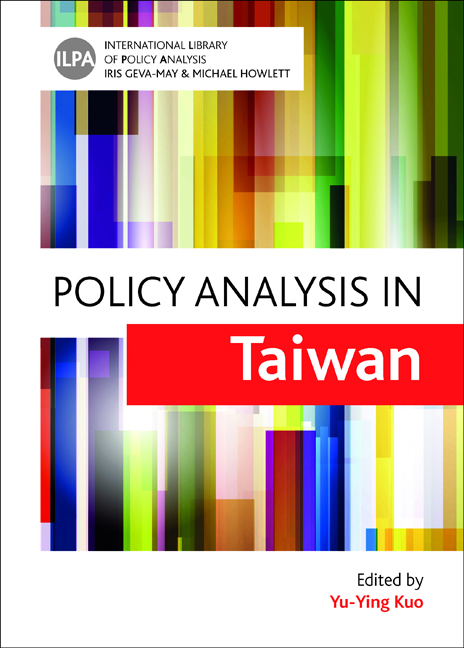Book contents
- Frontmatter
- Contents
- List of tables and figures
- Acknowledgements
- Notes on contributors
- One Policy analysis in a time of turbulence
- Two Exploring policy advisory committees in the central government
- Three Analysis of innovative local government policies in Taiwan
- Four Policy analysis in the legislative body: the legislative process of the Soil and Groundwater Pollution Remediation Act in Taiwan
- Five Policy analysis in the local councils
- Six Gendering policy analysis? The problems and pitfalls of participatory ‘gender impact assessment’
- Seven The power of influencing policies, or getting their share and more: interest groups in Taiwan
- Eight Think tanks in Taiwan
- Nine The development of public engagement in Taiwan
- Ten Social media and policy evolution in Taiwan
- Eleven Policy analysis by non-governmental organisations in Taiwan
- Twelve Policy network of universal healthcare reform in Taiwan
- Thirteen Public policy and administration research
- Fourteen Too critical to ignore? A tri-dimensional relationship examination of policy analysis internship in Taiwan
- Fifteen Policy analysis in Taiwan in an international perspective
- Sixteen Policy analysis education in Taiwan: a comparative perspective
- Index
Three - Analysis of innovative local government policies in Taiwan
Published online by Cambridge University Press: 11 March 2022
- Frontmatter
- Contents
- List of tables and figures
- Acknowledgements
- Notes on contributors
- One Policy analysis in a time of turbulence
- Two Exploring policy advisory committees in the central government
- Three Analysis of innovative local government policies in Taiwan
- Four Policy analysis in the legislative body: the legislative process of the Soil and Groundwater Pollution Remediation Act in Taiwan
- Five Policy analysis in the local councils
- Six Gendering policy analysis? The problems and pitfalls of participatory ‘gender impact assessment’
- Seven The power of influencing policies, or getting their share and more: interest groups in Taiwan
- Eight Think tanks in Taiwan
- Nine The development of public engagement in Taiwan
- Ten Social media and policy evolution in Taiwan
- Eleven Policy analysis by non-governmental organisations in Taiwan
- Twelve Policy network of universal healthcare reform in Taiwan
- Thirteen Public policy and administration research
- Fourteen Too critical to ignore? A tri-dimensional relationship examination of policy analysis internship in Taiwan
- Fifteen Policy analysis in Taiwan in an international perspective
- Sixteen Policy analysis education in Taiwan: a comparative perspective
- Index
Summary
Introduction
Policy analysis has been commonly acknowledged as one of the most important processes for avoiding policy failure, as well as for improving policy efficiency. This is especially true during the process of adopting highly uncertain new policy ideas. However, what are the analytical processes and assessment tools used by local governments to guide their adoption/rejection of innovative policies? By reviewing three cases of innovation adoption in Taiwan's local government, this chapter not only addresses this question, but also integrates theories of policy analysis with the theories of innovation adoption. This chapter is structured around five sections: the first three identify the common theoretical basis for innovation diffusion literature and policy analysis; the fourth section describes the policy analysis of Taiwan's local government innovations. The final section concludes the chapter and offers suggestions for the decision-making process regarding policy innovations.
Approach of Policy Analysis
Following the separation of public policy research from political science and public administration in the 1950s, policy analysis became an important academic topic within a relatively short period of time. One of the main reasons for this importance is that such analysis is required in policy implementation. Both pre-implementation assessments and overall post-implementation outcome reviews require the participation of policy analysts. However, due to its vast scope of application and the divergent emphases placed on policy analysis by different scholars, policy analysis itself is broadly defined. Given its objective of analysing a targeted issue from an overall perspective, Dunn (1993) stated that policy analysis belongs to the applied discipline. It employs multiple investigation methods and policy argumentation methods to create and transform policy data so that it can be applied in a political environment in order to analyse policies. Williams (1971) believed that policy analysis generates policy proposals via integrated data, and in turn determines the future demand based on such data. It is therefore similar to pre-implementation and feasibility assessments. Dye (1995) placed the focus of his study on the causal inferences of a policy. He claimed that the function of policy analysis is to describe and explain the causes and effects of implementing a certain policy, and that therefore the policy analysis procedure requires objective and precise methods, so that its explanatory power can be enhanced. Burt (1974) also believed that policy analysis is a pre-implementation assessment of a policy.
- Type
- Chapter
- Information
- Policy Analysis in Taiwan , pp. 39 - 52Publisher: Bristol University PressPrint publication year: 2015



